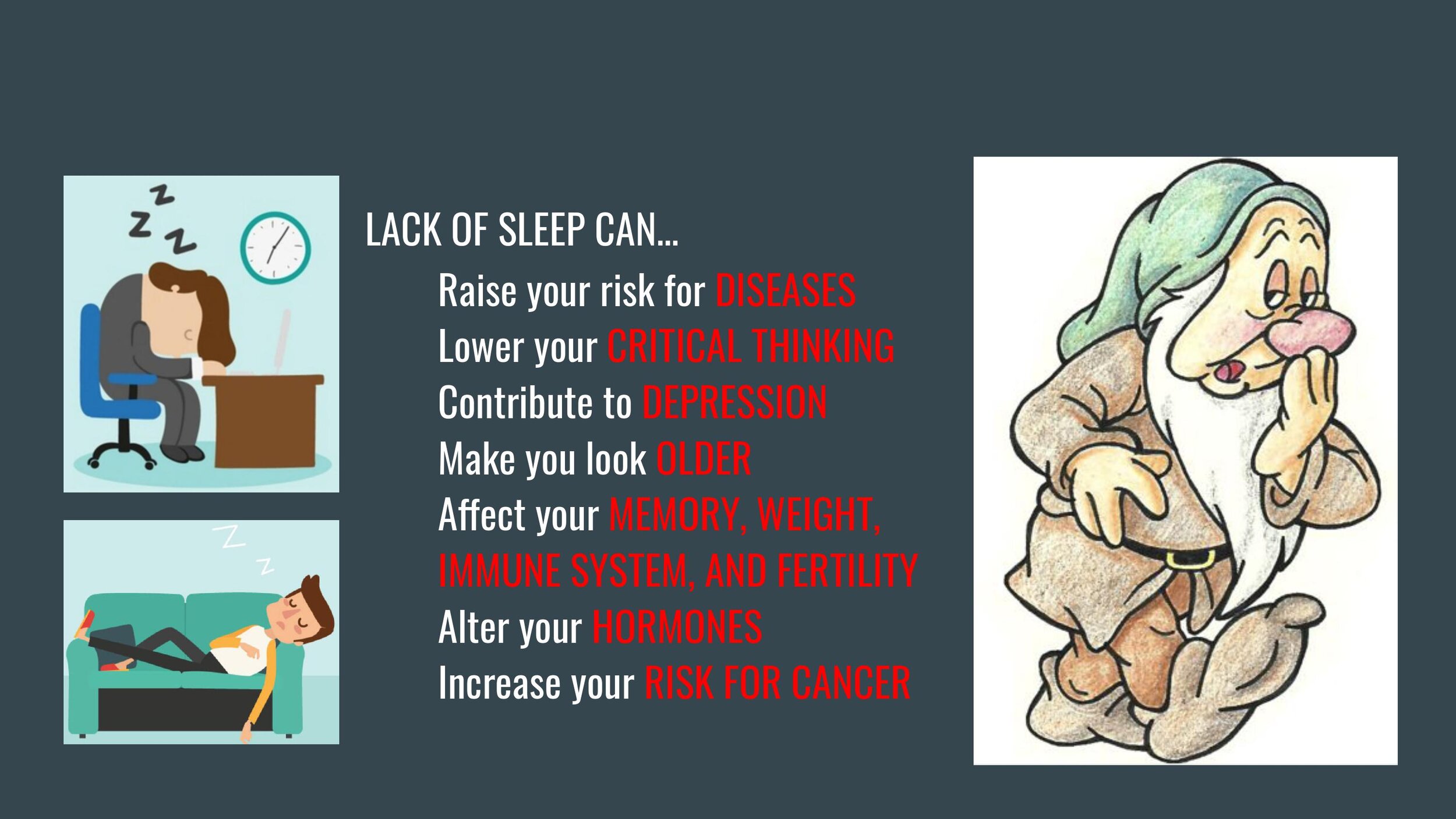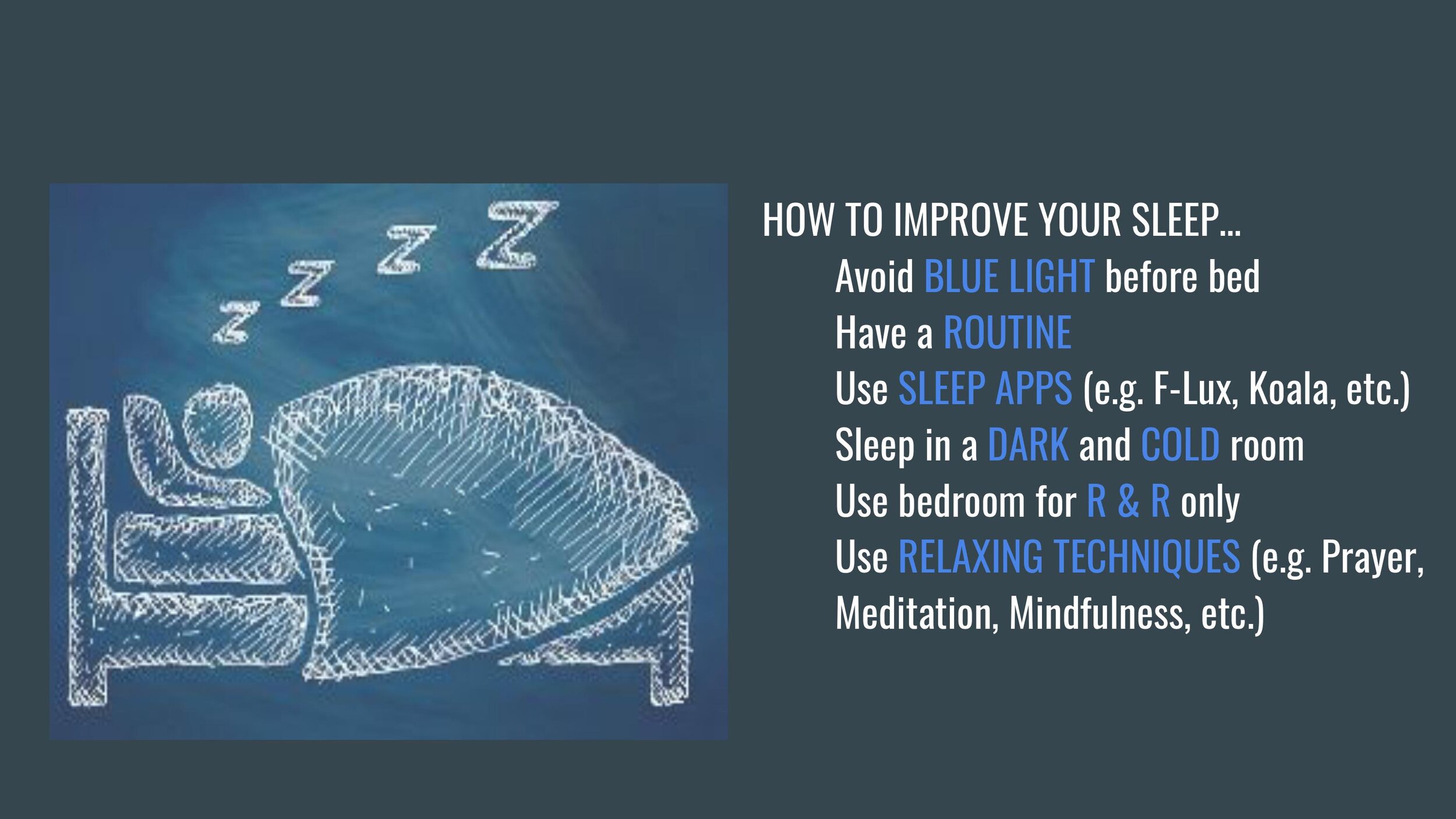Good morning, good afternoon, and good evening! For the next couple of blog posts, I’m taking an in depth look into the full sleep cycle; starting with our morning and following on into the afternoon and, not most importantly, the evening. We’ll take a look at the impact of sleep on our day to day lives; both now and in the long term.
For those of you who attended my Nutrition and Life Cycle Seminar last year, the following two slides may look familiar to you.
Recently, sleep has been a hot topic in the health and fitness industry. Which, on the one hand, has resulted in a lot of great research and publications, but has, on the other hand, led to an inundation of facts and figures that get lost in the day to day rat race. If you’re interested in the broad, too-busy-for-more-information wrap up, then stick with the slides above for the quick hit list of reasons WHY we need sleep and HOW we get better sleep. But if you’re interested in a few more details, that may help improve your health and day to day life, then keep reading below - and hopefully, I won’t put you to sleep.
RECIPE OF THE WEEK: Waffles
Ingredients:
1 large Egg, separated
1/4 cup Cashew Flour
1/4 cup Hazelnut Flour
1 Tbsp Stevia
1/2 tsp Baking Powder
1/4 tsp Sea Salt
2 Tbsp Butter
2 Tbsp Cashew Butter
1/4 cup Coconut Milk
1/2 tsp Vanilla Extract
(Adapted from a recipe on the Wholesome Yum website for Keto / Paleo Waffles. Find more on their website; https://www.wholesomeyum.com/)
Directions:
Beat the egg white until stiff. Set aside.
Combine flour, stevia, baking powder, and salt. Set aside.
Melt and whisk together the butter and cashew butter. Then add to the dry mixture from step 2.
Add the egg yolk, milk, and vanilla. Stir until smooth.
Fold the egg whites into the batter. Be careful not to over fold to keep the batter light and fluffy.
Cook the batter in a waffle iron, about 5 minutes for each waffle or until done. Waffles will crisp up as they go from hot to warm.
Serve with a side of protein.
How Our Diet Impacts Our Sleep
Before we begin, I want to start with the one key concept you should take away from any research on sleep, and it’s something we’ve all heard before: quality is just as, if not more, important that quantity.
Unfortunately, when it comes to research, it’s easier to track the quantity of sleep we get each night and much more difficult to track the quality. When tracking the quality of sleep, there are a number of factors that come into play. These can be tracked using wearable devices, such as Fitbits or, my personal favorite, the Oura ring or the with more high tech options, like a polysomnograph, but that’s an extreme option - even for me!
All of these tracking methods have one thing in common, they all quantify the same variables:
Deep sleep: also known as slow wave sleep (SWS), is the restorative phase of sleep and helps with memory consolidation
Rapid eye movement (REM): is when you experience dreams and also helps with memory consolidation
Sleep efficiency (SE): is the amount of time you’re actually asleep while you’re in bed
Sleep-onset latency (SOL): is the length of time it takes to fall asleep
One common way researchers track these variables without any technology is by using the Pittsburgh Sleep Quality Index Questionnaire. This is a subjective method, but it can give you an indication of the quality of sleep you’re getting. Another good way to track your sleep is by keeping a diary or record of it. Start with a two week period and extend this to longer if you want a broad idea of your sleep trends. One disclaimer here, if you’re anxious or stressed about sleep, continuous and meticulous tracking may not be a good option for you. Stressing about tracking your sleep, may lead to less sleep, which is counterproductive to our ultimate goal of getting you happier and healthier.
This week I want to talk about the impact of your eating schedule on sleeping. There have been a large number of studies completed that focus on a range of different aspects of sleep and although it is difficult to objectively confirm something based on such a large number of variables, it is widely agreed that,
“it is reasonable to suggest that calorie restriction influences sleep architecture… [however] research is limited on this topic and further investigation is warranted.” (1)
When to start eating
Something I bet you’ve all heard before is, “Breakfast is the most important meal of the day!” The truth of this statement is based on a few different things. Firstly, we need to caveat what the breakfast is. A meal of high carbohydrates, like cereal, porridge, toast, etc., first thing in the morning can make us feel sluggish and give us that “grain brain”, a familiar term for those of you who know me. And perhaps, most importantly, a meal like this will leave us craving carbs all day long, since it triggers our brain to expect more carbs to follow. Furthermore, carbs suppress our cortisol levels and we want our cortisol high in the mornings and low in the evenings. So if the body is expecting cortisol to be high in the morning, but you feed it carbs and lower the level, then you’re already impacting your sleep cycle - first thing in the morning!
If you wake up and start your day with healthy fats and proteins, maybe a bulletproof, fatty coffee or some eggs and smoked salmon, then you’re setting yourself up for a successful day.
For those of you who may be intermittent fasting, it’s common to start by trying to skip breakfast and start eating at lunchtime, but remember that your eating window needs to cycle to prevent your body and metabolism from acclimating. “Breaking your fast”, literally breakfast, in the morning is a natural way to signal to your body that it’s time to get up and get going! This starts your circadian clock off on the right note.
When to stop eating
It can be quite difficult not to eat before bed. The time in the evening when things are winding down and you don’t have work or kids or other tasks to keep you busy may seem like the perfect time to eat. But food is our fuel and we don’t need to be pumping our bodies full of fuel when we’re trying to wind down and get a little shut eye. Circadian fasting, when you have your last meal 3-5 hours before bedtime, gives your body one less thing to do in the evening. It signals to your body that it’s time for bed and gives the digestive system a break, so that you’re body can focus on regeneration of cells and recovery.
“If you stop eating before sunset, you’re encouraging your body’s natural sleep pattern by “circadian fasting.” When you go to bed with an empty stomach, the internal clocks in your digestive system align with the clock in your brain so that all your systems agree to go offline for sleep.” (2)
But it’s not just what we eat that impacts sleep; sleep also impacts what we want to eat. This is a cycle that can be hard to break. However, there are a number of studies that indicate
“chronic exposure to short sleep duration or an altered sleep architecture profile can lead to excess weight gain over time.” (3)
For those of you, who have tracked your sleep in the past, you may have noticed a trend between low sleep and high cravings. When we’re deprived of sleep, especially repeatedly, then our body starts to crave sugar and salt. This can negatively impact our food choices and lead to alterations from a set nutritional plan. To make it easier to choose healthy foods, one of the first things to do is make sure you’re getting enough good quality sleep.
In Summary: This week’s sleep challenge
For the next 7 days, eat a high protein and fat breakfast as soon as you wake up and stop eating 5 hours before you go to bed! I’d love to hear back via text or mail on how your week goes and if you notice any immediate impact to your sleep quality!
References:
(1) St-Onge, M. P., Mikic, A., & Pietrolungo, C. E. (2016). Effects of Diet on Sleep Quality. Advances in nutrition (Bethesda, Md.), 7(5), 938–949. https://doi.org/10.3945/an.116.012336
(2) Oura Article: Can Fasting Improve Your Sleep (https://ouraring.com/how-fasting-helps-sleep)
(3) Shechter, A., O'Keeffe, M., Roberts, A. L., Zammit, G. K., RoyChoudhury, A., & St-Onge, M. P. (2012). Alterations in sleep architecture in response to experimental sleep curtailment are associated with signs of positive energy balance. American journal of physiology. Regulatory, integrative and comparative physiology, 303(9), R883–R889. https://doi.org/10.1152/ajpregu.00222.2012





